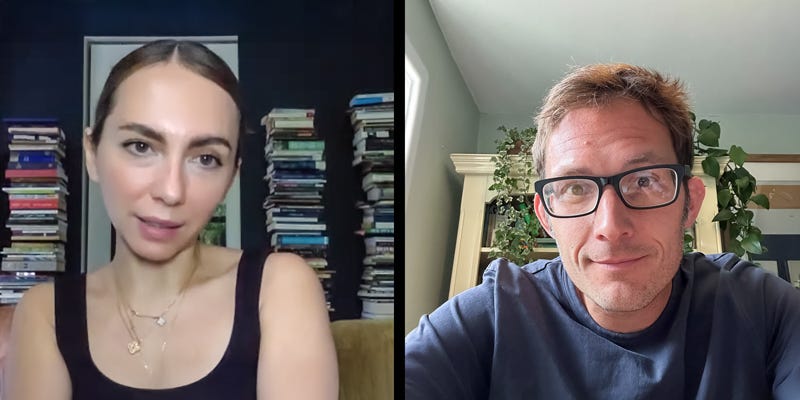Hello everybody,
This week we’re looking at writing and the unconscious with the writer, critic, and poet, Maya C. Popa.
You can find the companion article here: 3 ways to find and invite more wonder
Hindsight is a great storyteller.
When you think back to all those axis points in your life where you chose this path over that one, it’s easy to imagine that it was always meant to be. Everything seems obvious when you look back. Of course, meeting that person would mean you move to that city, take up that hobby, connect with that someone, and get that job. When the story is written, it’s easy to see the threads.
Arthur Schopenhauer called this fate, or the “will.” He believed there was some propulsive force to the Universe pushing everything along.
When I was younger, I hated the idea of fate. Like Neo meeting Morpheus in The Matrix, I hated the idea that I wasn’t in total, absolute control of my life. As I get older, I appreciate Schopenhauer more. Every chapter follows the other, and the book leads inexorably along a narrative.
But being a scientifically dyed sort of mind, I still find fate hard to swallow. It’s a bit “woo-woo,” as the TikTok lot call it. And so, when Maya C. Popa introduced me to this quote from Carl Jung in this week’s interview, I leapt at it:
“Until you make the unconscious conscious, it will direct your life and you will call it fate.”
Don’t get me wrong, Jungianism isn’t that many steps away from the “woo-woo” stuff, but at least it’s draped in some kind of acceptable psychobabble. So, this week, we look at the unconscious, the muses, and art.

The collective reservoir of inspiration
The core assumption at the heart of psychotherapy is that there are forces, drives, and unknown happenings whirring behind the scenes. Buried within our unconscious are various important things — why you find that person attractive, why you find it so hard to get up in the morning, why you find Beth at work so oddly infuriating. “It wasn’t what she said, it was how she said it.”
So, the job of a good psychotherapist has always been to try and reveal some of those important unknowns. How a good psychotherapist does that is up for debate. The unconscious might reveal itself during an hour-long talking therapy. It might pop up in the red haze of a heated argument. Freud thought we caught glimmers of the unconscious in the dreams we had and the jokes we told.
Popa’s Jung reference really got me. She runs a group called the “Conscious Writers Club,” where “conscious” has a double meaning. The first is more straightforward: Here is a group of people who are consciously trying to improve their writing. The second, though, links back to what Jung has to say: Art, and writing specifically, makes the unconscious conscious.
Great writing is a skill, no doubt. You have to learn how to craft a good turn of phrase and how to plot and pace. As with all skills, you can get better at it with a magic cocktail of practice, imitation, and a bit of genetic luck. But there is also something else to writing — and probably all art, actually — and that is what history’s more pretentious artists have liked to call “the muses.”
The muses are a kind of aesthetic force that artists either channel or are possessed by. They’re a kind of artistic ambrosia or diesel in the tank, depending on how earthy you like your metaphors.
“I think my job is as the book's midwife or the poem's midwife. […] The expertise I bring is helping people get out of their own way by revealing what they're thinking to them. […] We're inviting someone to eavesdrop on the internal life — and we're doing so as musically and poignantly as possible, to get away from the utilitarian uses of language.”
Talking with Popa and writing this newsletter has encouraged me to share a theory I’ve been working on for a while. I’ll call it the “Closed Loop of Inspiration,” but I’m open to better suggestions.
My basic idea is that all artists have a kind of “inspiration tank” that they use up when they create great art. But these artists — and possibly all humans— need to refill that tank from time to time. If you spend too long telling stories, you run out of stories to tell. And so, you need to either hear more stories or earn more stories. You need to read more before you can talk more, and you need to see more before you can share more. There are many ways to refill the tank: read poetry, go for a walk, book a flight to Istanbul, get outrageously drunk with strangers, do something totally and embarrassingly stupid.
I call it the “Closed Loop” so that we can all remember that we are part of this loop. What we do, say, and create will spill out into the great artistic reservoir of the world. You are the reason someone danced. You are the reason someone sang a sad song. Our stories and our art spill out into the world and swirl together.
Are you in a storytelling or story-listening phase of your life?
IN YOUR OPINION
I’ve always been attracted to poetry, but never really found the best way in. I’ve always imagined it to be a bit like music. You hardly ever hear someone say, “I don’t like music.” You just need to find the right kind of music and the right kind of artist. Likewise with poetry. I’ve never really found the right kind of poetry.
Below this, I’ve linked to the top poems recommended by Mini Philosophers in order or popularity. I hope you enjoy them.
If — Rudyard Kipling
Ozymandias — Percy Bysshe Shelley
The Raven — Edgar Allan Poe
Invictus — W.E. Henley
The Road Not Taken — Robert Frost
Stopping by Woods on a Snowy Evening — Robert Frost
Desiderata — Max Ehrmann
Phenomenal Woman — Maya Angelou
Ulysses — Alfred, Lord Tennyson
The Lake Isle of Innisfree — W.B. Yeats
Acquainted with the Night — Robert Frost
Sea-Fever — John Masefield
Dulce et Decorum Est — Wilfred Owen
Ode to a Nightingale — John Keats
Howl — Allen Ginsberg
Next week, we’re exploring dualism and the philosophy of evil with the legendary Iain McGilchrist and so I’m asking:
Is there a difference between “bad” and “evil”? If so, what?
Send me your thoughts via email or comment below.
MINI READING LIST
RESOURCES
This newsletter contains my reflection on the topic at hand. Here is a list of the material shared in this email, as well as extra content about the topic that I've shared on my other social platforms:
The companion article inspired by my conversation with Maya C. Popa.
My short video exploring the importance of art and slowing down, featured on Mini Philosophy's Instagram page
The full, unedited audio interview with Maya C. Popa:
Jonny is the creator of the Mini Philosophy social network. He’s an internationally bestselling author of three books and the resident philosopher at Big Think. He's known all over the world for making philosophy accessible, relatable, and fun.
More Big Think content:
Big Think | Big Think Business | Starts with a Bang | Big Think Books








Looking forward to next weeks dialogue (bad vs evil) 😊 Alan Watts had a distinct style and perspective on concepts like bad and evil, often rooted in Eastern philosophy and his critique of Western dualistic thinking. He saw bad as natural difficulties or harm in life like sickness or setbacks not necessarily evil. Evil, he said, is often a human-made concept of absolute, intentional harm. He challenged rigid “good vs. evil” ideas, encouraging us to see life’s complexity instead of strict moral divisions.
Actually, your little essays are some of my most enjoyed stops at the 'filling station of the muses.' So please pump away. I mark and add bits of reflected wisdom back into the characterizations and use the characters to answer some of your openly dropped questions. I must also say that your videos add a lot of sincerity to the essays.